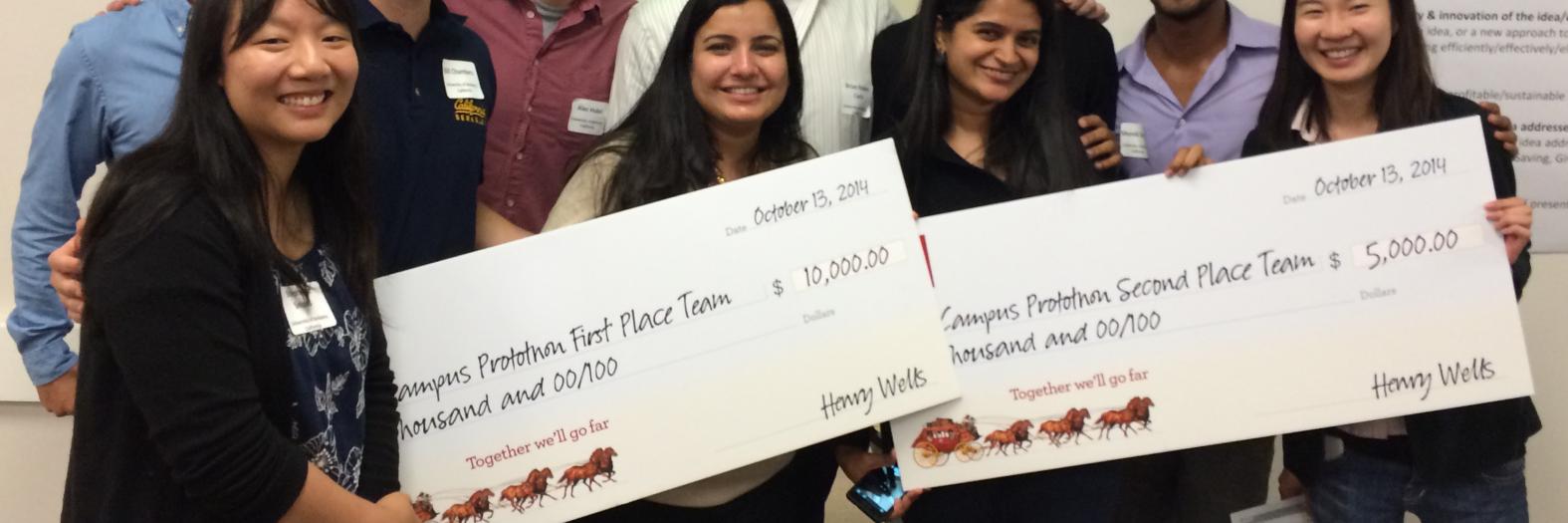By Taylor H. Blanchard, Wells Fargo Stories
In San Francisco, two teams of students from the Berkeley School of Infromation, along with seven other teams from UC Berkeley and Stanford University, sketched ideas on a forest of whiteboards, scribbled on a blizzard of post-it notes, and huddled over laptops. The goal of their frenetic work: devise ways that technology can enable millennials to improve their financial health, and come up with ideas to combat the generation’s anxiety about their finances.
Their challenge was part of Wells Fargo’s first Campus Protothon. At a protothon, people work together to discover solutions to a customer service question. It’s based on the popular hackathon concept, but doesn’t require coding.
“The Campus Protothon was a great opportunity to bring together students to solve how to help millennials improve their financial health,” says Charles Thomas, Wells Fargo’s chief data officer.
A Wells Fargo survey found that while millennials feel overwhelmingly optimistic about their financial future, only 55 percent are saving for retirement. Debt is their biggest financial worry, with student loans ranking as their top concern after paying day-to-day bills.
To start the day, students were presented with a question: “How might we design an experience to engage and motivate millennials to improve one or more of their vital signs to financial health?”
Teams of two to five students arrived at their solutions by using human-centered innovation techniques and “whole brain” thinking, says Melanie Arens, head of innovation for the Customer Experience team. “At the end of one day we came out with concepts that are really quite impressive,” she says.
Each team also worked with a mentor who provided guidance. Mentors included Wells Fargo team members from a number of disciplines as well as startup founders Zaydoon Munir of Revolution Credit, which creates financial health solutions, and Joe Hellerstein of Trifacta, a data analytics company.
After nine hours of work, teams presented their ideas to a panel of judges.
Winning ideas
The first-place team — Team Seedling — was from the School of Information at Berkeley and won $10,000. “Our solution was to find a way to make financial advice online more comfortable for millennials, because it can be a big source of anxiety and they might not necessarily be interested in going to traditional channels for advice,” says Brian Carlo of Team Seedling. “Our basic idea is to build a forum where millennials can talk about financial issues on their own terms, and provide a way for Wells Fargo professionals to come in and add their own advice in an organic way.”
Team #FinFit ― also from the School of Information at Berkeley ― placed second and won $5,000. One of the members of the team, Shomik Sarkar, explained that their idea is a financial fitness app — combined with a coach. “The app provides goals and daily financial fitness tests, and the coach builds a support system to help you be more financially fit,” he says.
Members of both winning teams say they will most likely use their prize money to help with school expenses. “We’re all graduate students so we can use a little extra cash to help with our tuition,” says Shomik.
The protothon is an extension of Innovation Bootcamps that Wells Fargo has been holding internally for several years. At an Innovation Bootcamp, team members learn innovation skills, trends, and user-centered design, and how to apply those skills at work.
Wells Fargo has held 20 internal Innovation Bootcamps and protothons this year.
Roohi Moolla, head of strategy and trends for Enterprise Social media, says, “The protothon is a great opportunity for Wells Fargo and millennials to work alongside startup and industry experts to shape solutions for our millennial customers. We’re thrilled to hear firsthand what millennials really want from us to help solve their financial challenges, and many of the ideas involved social and collaborative elements at the core.”
The Campus Protothon team is looking to expand the protothon concept to other universities.










